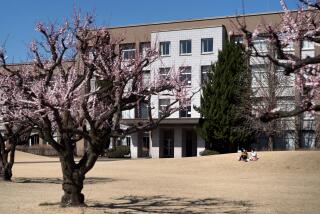Japan’s Stock Market Reflects Big Problems
- Share via
The sharp rise in Japanese interest rates since early 1989 is no doubt one of the causes of the recent fall in stock prices on the Tokyo Stock Exchange. With the yield on the 10-year Japanese government bond at 7.3%, up from 4.2% at the end of 1988, Japanese investors are obviously drawn away from much riskier equities.
But the weakness in Japanese stocks may also reflect fundamental long-term shifts in that nation’s place in the world economy.
There is no question that Japan is an emerging world power, just like the United States was during and after World War I. However, emerging world powers can still go through some tough times on their way to greatness. That happened in the United States in the 1930s, when the excess capacity built up during World War I and during the 1920s took a decade and finally World War II to absorb. Similarly, Japan may be in for a period of transition and consolidation in the 1990s.
The immense global financial power Japan has gained in the past decade is in large part due to its huge current account surpluses. Concentration on exports, especially to the insatiable U.S. consumer, produced trade surpluses totaling $422 billion in the 1980s. Their counterpart, dollar for dollar, was the increase in Japanese ownership of foreign assets, mainly in the United States.
When Japanese investors put most of their surplus dollars in U.S. Treasury obligations, few Americans were aware of Japan’s large current account surplus with the United States. But that changed when Japanese investors bought Rockefeller Center and other highly conspicuous properties. The American public’s concern over Japanese investment helped the Bush Administration and Congress, which have grown increasingly impatient with the lack of progress in talks to open Japanese markets to U.S. goods.
Washington’s belief that Japan isn’t playing fair could be enhanced if the Tokyo stock market continues to slide. That would strip away profits from zaitekku --the practice of larger companies augmenting their earnings through appreciation in their holdings of other companies’ stocks--and reveal that many Japanese companies have slim operating earnings. The Bush Administration and Congress might then conclude that those companies were indeed dumping their products in the United States, since they were showing far less than a normal return on their businesses.
Washington’s frustrations have reached the point that President Bush reportedly spent half the time in his meeting with Prime Minister Toshiki Kaifu last month on trade issues. There is no question that the Japanese have taken advantage of the openness of the U.S. economy, and the free spending--even profligate ways--of U.S. consumers who love high-quality Japanese products.
But it seems unlikely that Japan will change its longstanding business customs fast enough to satisfy Washington’s demands. It will also be difficult for Japan to adjust its trade imbalances because few foreign companies have operations in Japan that can help speed the process. Foreign companies own only about 1% of Japan’s assets, compared to 17% in West Germany and 9% in the United States.
Unless Japan can miraculously satisfy Washington on the trade issues quickly, protectionist actions against it seem almost inevitable. This would only add to the high and growing protectionist wall that Europe has built against Japan. The result would be much slower growth, or even a decline in Japanese exports, the lifeblood of the country’s global power in the past decade.
In addition, the big surge in U.S. consumer spending is over, and Americans may become big savers in the years ahead. Savings will be encouraged as American consumers work down their huge debt load, the population ages, the distribution of income shifts toward higher-income households and the postwar surge in house prices ends. More U.S. saving means slower spending growth, including spending on imports.
At the same time, Japanese import growth may quicken, as the Japanese people seek a better quality of life. Pay levels in Japan and the United States are nearly identical, but Japan’s distribution system is so inefficient that the Japanese living standard is only about two-thirds of the U.S. level. One recent survey shows that, on average, prices in Japan are 39% higher than in the United States. No one suggests that the Japanese people’s legendary propensity to save, which has been of key importance in keeping interest rates low, will fall to the recent low U.S. savings rates. But the desire for higher living standards may work in that direction.
I have no doubt that the resourceful Japanese will cope with growing protectionism in Europe and the United States, slower export growth, pressure for a higher pace of imports and costlier capital. But these transitions could be disruptive in a society with an orientation toward high saving, self-sacrifice in the interest of the nation and an export-or-die mentality. Furthermore, these changes all point to slower growth of Japan’s international financial power compared to the explosion of the 1980s. In contrast, Germany may well find her place in the sun in the 1990s as it gains more strength from the 1992 trade integration of the European Economic Community, the union of East and West Germany and the opening of Eastern Europe and the Soviet Union.
It may be, then, that the current slide in the Japanese stock market is reflecting not only overblown and vulnerable stock prices, but also a number of fundamental and difficult transitions in the Japanese economy, and the likely shift in the center of economic growth and financial power in the 1990s from the Far East to Europe.
More to Read
Inside the business of entertainment
The Wide Shot brings you news, analysis and insights on everything from streaming wars to production — and what it all means for the future.
You may occasionally receive promotional content from the Los Angeles Times.










